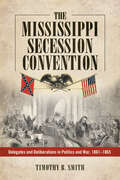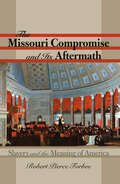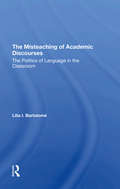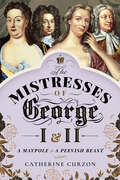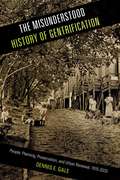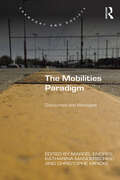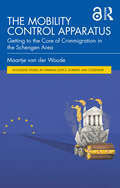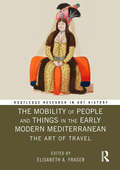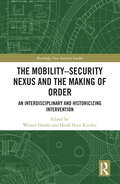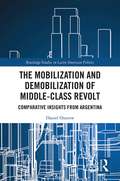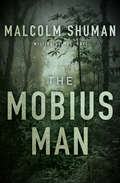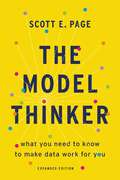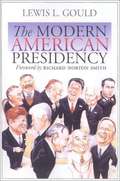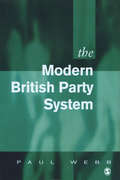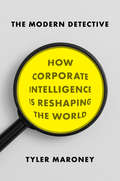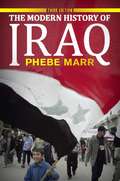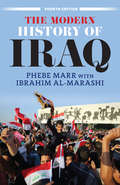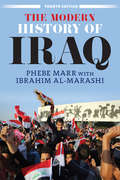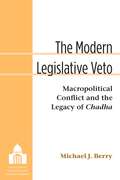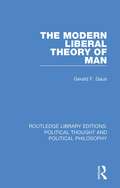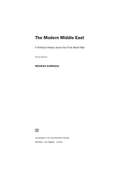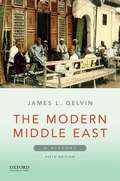- Table View
- List View
The Mississippi Secession Convention: Delegates and Deliberations in Politics and War, 1861-1865
by Timothy B. SmithThe Mississippi Secession Convention is the first full treatment of any secession convention to date. Studying the Mississippi convention of 1861 offers insight into how and why southern states seceded and the effects of such a breech. Based largely on primary sources, this book provides a unique insight into the broader secession movement.There was more to the secession convention than the mere act of leaving the Union, which was done only three days into the deliberations. The rest of the three-week January 1861 meeting as well as an additional week in March saw the delegates debate and pass a number of important ordinances that for a time governed the state. As seen through the eyes of the delegates themselves, with rich research into each member, this book provides a compelling overview of the entire proceeding.The effects of the convention gain the most analysis in this study, including the political processes that, after the momentous vote, morphed into unlikely alliances. Those on opposite ends of the secession question quickly formed new political allegiances in a predominantly Confederate-minded convention. These new political factions formed largely over the issues of central versus local authority, which quickly played into Confederate versus state issues during the Civil War. In addition, author Timothy B. Smith considers the lasting consequences of defeat, looking into the effect secession and war had on the delegates themselves and, by extension, their state, Mississippi.
The Missouri Compromise and Its Aftermath
by Robert Pierce ForbesRobert Pierce Forbes goes behind the scenes of the crucial Missouri Compromise, the most important sectional crisis before the Civil War, to reveal the high-level deal-making, diplomacy, and deception that defused the crisis, including the central, unexpected role of President James Monroe. Although Missouri was allowed to join the union with slavery, the compromise in fact closed off nearly all remaining federal territories to slavery. When Congressman James Tallmadge of New York proposed barring slavery from the new state of Missouri, he sparked the most candid discussion of slavery ever held in Congress. The southern response quenched the surge of nationalism and confidence following the War of 1812 and inaugurated a new politics of racism and reaction. The South's rigidity on slavery made it an alluring electoral target for master political strategist Martin Van Buren, who emerged as the key architect of a new Democratic Party explicitly designed to mobilize southern unity and neutralize antislavery sentiment. Forbes's analysis reveals a surprising national consensus against slavery a generation before the Civil War, which was fractured by the controversy over Missouri.Robert Pierce Forbes goes behind the scenes of the crucial Missouri Compromise, the most important sectional crisis before the Civil War, to reveal the high-level deal-making, diplomacy, and deception that defused the crisis, including the central, unexpected role of President James Monroe. Although Missouri was allowed to join the union as a slave state, Forbes observes, the compromise in fact closed off nearly all remaining federal territory to slavery. Forbes's analysis reveals a surprising national consensus against slavery a generation before the Civil War, which was fractured by the controversy over Missouri.-->
The Misteaching Of Academic Discourses: The Politics Of Language In The Classroom
by Lilia I BartolomeThis book discusses the significance of teaching working-class linguistic minority students academic discourse styles necessary for success in school and describes one teacher's attempts to do so. It is for all those educators who are faced with issues of language, race, and class.
The Mistresses of George I & II: A Maypole & a Peevish Beast
by Catherine CurzonWhen George I arrived in England he found a kingdom in turmoil. Mistrustful of the new monarch from Hanover, his subjects met his coronation with riots. At George’s side was his mistress, Melusine von der Schulenberg, whilst his ex-wife languished in prison. Known as the Maypole thanks to her eye-catching figure, Melusine was the king’s confidante for decades. She was a mother to his children and a queen without a crown. George II never forgave his father for tearing him from his mother's arms and he was determined to marry for love, not duty. Though his wife, Caroline of Ansbach, proved to be a politically gifted queen, George II turned to another for affection. She was Henrietta Howard, the impoverished Countess of Suffolk, and she was desperate to escape her brutish husband. As the years passed, the royal affair became a powerplay between king and queen and the woman who was mistress to one and servant to another. Melusine and Henrietta's privileged position made them the envy of every courtier. It also made them a target of jealousy, plotting and ambition. In the tumultuous Georgian court, the bedroom and the throne room weren't so far apart.
The Misunderstood History of Gentrification: People, Planning, Preservation, and Urban Renewal, 1915-2020 (Urban Life, Landscape and Policy #84)
by Dennis E. GaleThe origins of gentrification date back to World War I—only it was sometimes known as “remodeling” then. Dennis Gale’s insightful book, TheMisunderstood History of Gentrification, provides a recontextualization of American gentrification, planning, and policymaking. He argues that gentrification must be understood as an urban phenomenon with historical roots in the very early twentieth century. Gale uses solid empirical evidence to trace the embryonic revitalization of Georgetown, Greenwich Village, Beacon Hill, and elsewhere back to 1915. He shows how reinvestment and restoration reversed urban decline and revitalized neighborhoods. The Misunderstood History of Gentrification also explains how federal policies such as the Urban Redevelopment Program (later named Urban Renewal), which first emerged in 1949, razed urban slums and created an “urban crisis” that persisted in the 1960s and ‘70s. This situation soon prompted city gentrifiers and historic preservationists to reuse and rehabilitate existing structures. Within a more expansive historical framework, Gale offers a fresh perspective on and debunks misperceptions about gentrification in America.
The Misunderstood History of Gentrification: People, Planning, Preservation, and Urban Renewal, 1915-2020 (Urban Life, Landscape and Policy #84)
by Dennis E. GaleThe origins of gentrification date back to World War I—only it was sometimes known as “remodeling” then. Dennis Gale’s insightful book, TheMisunderstood History of Gentrification, provides a recontextualization of American gentrification, planning, and policymaking. He argues that gentrification must be understood as an urban phenomenon with historical roots in the very early twentieth century. Gale uses solid empirical evidence to trace the embryonic revitalization of Georgetown, Greenwich Village, Beacon Hill, and elsewhere back to 1915. He shows how reinvestment and restoration reversed urban decline and revitalized neighborhoods. The Misunderstood History of Gentrification also explains how federal policies such as the Urban Redevelopment Program (later named Urban Renewal), which first emerged in 1949, razed urban slums and created an “urban crisis” that persisted in the 1960s and ‘70s. This situation soon prompted city gentrifiers and historic preservationists to reuse and rehabilitate existing structures. Within a more expansive historical framework, Gale offers a fresh perspective on and debunks misperceptions about gentrification in America.
The Mobilities Paradigm: Discourses and Ideologies (Transport and Society)
by Katharina Manderscheid Marcel Endres Christophe MinckeOver the last two decades, the conceptualisation and empirical analysis of mobilities of people, objects and symbols has become an important strand of social science. Yet, the increasing importance of mobilities in all parts of the social does not only happen as observable practices in the material world but also takes place against the background of changing discourses, scientific theories and conceptualisations and knowledge. Within the formation of these mobilities discourses, the social sciences constitute a relevant actor. Focussing on mobility as an object of knowledge from a Foucauldian perspective rather than a given entity within the historical contingency of movement, this book asks: How do discourses and ideologies structure the normative substance, social meanings, and the lived reality of mobilities? What are the real world effects of/on the will and the ability to be mobile? And, how do these lived realities, in turn, invigorate or interfere with certain discourses and ideologies of mobility?
The Mobility Control Apparatus: Getting to the Core of Crimmigration in the Schengen Area (Routledge Studies in Criminal Justice, Borders and Citizenship)
by Maartje van der WoudeThis book critically explores the complexities of intra-Schengen border control and migration dynamics within Europe. It provides a comprehensive analysis of how various actors, including border officials and state apparatuses, interact in managing mobility and enforcing controls. The theoretical foundation draws on Foucault’s concept of the dispositif, examining how borders are enforced through a combination of legal frameworks, discourses, and on-the-ground practices.The book emphasises the importance of discretion in border control, arguing that it plays a pivotal role in shaping decisions at both the organisational and street levels. It delves into the experiences of Dutch border control officers and the wider European context, offering a comparative analysis of Europe’s intra-Schengen borderlands. By drawing on real-world case studies, it showcases the tensions between security and mobility and how migration is managed through both visible and covert policing practices. The work is grounded in rich qualitative data, collected over years of fieldwork, and addresses key debates in migration and criminology studies, particularly the evolving concept of ‘crimmigration’ and its implications for human rights and security policies.This book will be of interest to criminologists, sociologists, legal scholars, and political scientists alike, as well as all those engaged in studies on migration, mobility, and the European Union.The Open Access version of this book, available at http://www.taylorfrancis.com, has been made available under a Creative Commons [Attribution-Non Commercial-No Derivatives (CC-BY-NC-ND)] 4.0 license.
The Mobility of People and Things in the Early Modern Mediterranean: The Art of Travel (Routledge Research in Art History)
by Elisabeth A. FraserFor centuries artists, diplomats, and merchants served as cultural intermediaries in the Mediterranean. Stationed in port cities and other entrepôts of the Mediterranean, these go-betweens forged intercultural connections even as they negotiated and sometimes promoted cultural misunderstandings. They also moved objects of all kinds across time and space. This volume considers how the mobility of art and material culture is intertwined with greater Mediterranean networks from 1580 to 1880. Contributors see the movement of people and objects as transformational, emphasizing the trajectory of objects over single points of origin, multiplicity over unity, and mutability over stasis.
The Mobility-Security Nexus and the Making of Order: An Interdisciplinary and Historicizing Intervention (Routledge New Security Studies)
by Heidi Hein-Kircher Werner DistlerThe book explores the complex, multi-directional connections of the "mobility/security nexus" in the re-ordering of states, empires, and markets in historical perspective. Contributing to a vivid academic debate, the book offers in-depth studies on how mobility and security interplay in the emergence of order beyond the modern state. While mobilities studies, migration studies and critical security studies have focused on particular aspects of this relationship, such as the construction of mobility as a political threat or the role of infrastructure and security, we still lack comprehensive conceptual frameworks to grasp the mobility/security nexus and its role in social, political, and economic orders. With authors drawn from sociology, International Relations, and various historical disciplines, this transdisciplinary volume historicizes the mobility-security nexus for the first time. In answering calls for more studies that are both empirical and have historical depth, the book presents substantial case studies on the nexus, ranging from the late Middle Ages right up to the present-day, with examples from the British Empire, the Russian Empire, the Habsburg Empire, Papua New Guinea, Rome in the 1980s or the European Union today. By doing so, the volume conceptualizes the mobility/security nexus from a new, innovative perspective and, further, highlights it as a prominent driving force for society and state development in history. This book will be of much interest to researchers and students of critical security studies, mobility studies, sociology, history and political science.
The Mobilization and Demobilization of Middle-Class Revolt: Comparative Insights from Argentina (Routledge Studies in Latin American Politics)
by Daniel OzarowAdopting Argentina’s popular uprisings against neoliberalism including the 2001-02 rebellion and subsequent mass protests as a case study, The Mobilization and Demobilization of Middle-Class Revolt analyzes two decades of longitudinal research (1995-2018), including World Bank and Latinobarómeter household survey data, along with participant interviews, to explore why nonpolitically active middle-class citizens engage in radical protest movements, and why they eventually demobilize. In particular it asks, how do they become politicized and resist economic and political crises, along with their own hardship? Theoretically informed by Gramsci’s notions of hegemony, ideology and class consciousness, Ozarow posits that to affect profound and lasting social change, multisectoral alliances and sustainable mobilizing vehicles are required to maintain radical progressive movements beyond periods of crisis. With the Argentinian revolt understood to be the ideological forbearer to the autonomist-inspired uprisings which later emerged, comparisons are drawn with experiences in the USA, Spain, Greece UK, Iceland and the Middle East, as well as 1990s contexts in South Africa and Russia. Such a comparative analysis helps understand how contextual factors shape distinctive struggling middle-class citizen responses to external shocks. This book will be of immense value to students, activists and theorists of social change in North America, in Europe and globally.
The Mobilization of Political Islam in Turkey
by Banu EligürThe Mobilization of Political Islam in Turkey explains why political Islam, which has been part of Turkish politics since the 1970s but on the rise only since the 1990s, has now achieved governing power. Drawing on social movement theory, the book focuses on the dominant form of Islamist activism in Turkey by analyzing the increasing electoral strength of four successive Islamist political parties: the Welfare Party; its successor, the Virtue Party; and the successors of the Virtue Party: the Felicity Party and the Justice and Development Party. This book, which is based on extensive primary and secondary sources as well as in-depth interviews, provides the most comprehensive analysis currently available of the Islamist political mobilization in Turkey.
The Mobius Man (Pete Brady Mystery)
by Malcolm Shuman M. S. KarlHunting Mexican guerillas, a CIA agent fights to regain his memory and stay aliveDavid doesn&’t remember the bomb going off. In fact, he doesn&’t remember anything at all. He was on a mission in Buenos Aires when the explosion sent a piece of shrapnel into his skull, and it missed killing him by a fraction of an inch. His memory in tatters, he returns to the United States to heal, meeting his wife for what seems like the first time. His memory will return gradually, the doctors say, but for now he feels like half a man—half a man who is about to take on a mission.In Mexico, the CIA has been paying a guerilla organization to keep radical militants at bay. When their liaison with the rebels is found dead, David is sent to discover who killed him and why. Though his memory might never return, as he slips deeper into the shadowy world of Mexican outlaws, David will see things he&’d just as soon forget.
The Model Thinker: What You Need to Know to Make Data Work for You
by Scott E. PageHow anyone can become a data ninja From the stock market to genomics laboratories, census figures to marketing email blasts, we are awash with data. But as anyone who has ever opened up a spreadsheet packed with seemingly infinite lines of data knows, numbers aren't enough: we need to know how to make those numbers talk. In The Model Thinker, social scientist Scott E. Page shows us the mathematical, statistical, and computational models--from linear regression to random walks and far beyond--that can turn anyone into a genius. At the core of the book is Page's "many-model paradigm," which shows the reader how to apply multiple models to organize the data, leading to wiser choices, more accurate predictions, and more robust designs. The Model Thinker provides a toolkit for business people, students, scientists, pollsters, and bloggers to make them better, clearer thinkers, able to leverage data and information to their advantage.
The Modern American Presidency
by Lewis L. Gould"The Modern American Presidency" is a lively, interpretive synthesis of 20th century leaders, filled with intriguing insights into how the presidency has evolved as America rose to prominence on the world stage. Gould traces the decline of the party system and the increasing importance of the media, resulting in the rise of the president as celebrity.
The Modern British Party System
by Dr Paul D Webb`This is a really excellent book, the best on British parties that I have read in recent years. Paul Webb utilises the latest research and modern analytical techniques to provide a sophisticated study of parties and the party system which is packed with information. It is a major contribution not just to the literature on British politics but also to the comparative literature on political parties' - David Denver, Lancaster University `Paul Webb's new book is likely to remain the standard work on the British party system for years to come' - Peter Mair, University of Leiden `A landmark study. I cannot commend this book too highly to teachers of British politics, students and professional analysts alike' - Ian Budge, University of Essex `An excellent book that will be much quoted by scholars in future years' - Alan Ware, Oxford University `Paul Webb provides the most comprehensive and well-documented analysis of the programmatic and organizational changes in the British party system. His conclusion that British parties remain critically important to the functioning of democracy is strengthened by his comparative approach. This book is a major contribution to the study of British party politics' - Patrick Seyd, University of Sheffield Providing a complete up-to-date overview of the changing nature of contemporary party politics in Britain, this book draws on models of comparative politics and the latest empirical analysis to explain the capacity of British parties to adapt to a changing political environment. A number of broad themes include: the nature and extent of party competition; the internal life and organizational development of parties; the variety of evolving party systems in the United Kingdom; and the links between parties and the wider political system. The current weaknesses of party performance are addressed, and the scope of reform explained and examined. Contrary to claims of 'decline', however, the book demonstrates that party politics remain essentially vibrant and intrinsic to modern British democracy. The Modern British Party System will be an essential text for all students of contemporary British politics, parties and party systems.
The Modern Detective: How Corporate Intelligence Is Reshaping the World
by Tyler MaroneyA fascinating examination of the world of private investigators by a 21st-century private eye.Today's world is complicated: companies are becoming more powerful than nations, the lines between public and corporate institutions grow murkier, and the internet is shredding our privacy. To combat these onslaughts, people everywhere -- rich and not so rich, in business and in their personal lives -- are turning away from traditional police, lawyers, and government regulators toward a new champion: the private investigator.As a private investigator, Tyler Maroney has traveled the globe, overseeing sensitive investigations and untying complicated cases for a wide array of clients. In his new book, he shows that it's private eyes who today are being called upon to catch corrupt politicians, track down international embezzlers, and mine reams of data to reveal which CEOs are lying. The tools Maroney and other private investigators use are a mix of the traditional and the cutting edge, from old phone records to computer forensics to solid (and often inspired) street-level investigative work. The most useful assets private investigators have, Maroney has found, are their resourcefulness and their creativity.Each of the investigations Maroney explores in this book highlights an individual case and the people involved in it, and in each account he explains how the transgressors were caught and what lessons can be learned from it. Whether the clients are a Middle Eastern billionaire whose employees stole millions from him, the director of a private equity firm wanting a background check on a potential hire (a known convicted felon), or creditors of a wealthy American investor trying to recoup their money after he fled the country to avoid bankruptcy, all of them hired private investigators to solve problems the authorities either can't or won't touch. In an era when it's both easier and more difficult than ever to disappear after a crime is committed, it's the modern detective people are turning to for help, for revenge, and for justice.
The Modern History of Iraq
by Phebe MarrMarr (a member of the Council on Foreign Relations and the Middle East Institute) has updated her single-volume treatment, aimed at the general reader, of the political, economic, and social history of Iraq so as to cover the momentous events that followed the US invasion and occupation. Her narrative is guided by four key themes: the creation and construction of a modern state and the search for a cultural and national identity capable of bringing together Iraq's various ethnic, religious, and social groups; the process of economic and social development; the development of political institutions and ideologies and their interrelationship with domestic society and the world outside Iraq; and foreign domination and the interaction of Iraq with the West, neighboring countries, and the global environment. Annotation ©2011 Book News, Inc. , Portland, OR (booknews. com)
The Modern History of Iraq
by Phebe MarrNow in its third edition, The Modern History of Iraq places in historical perspective the crises and upheavals that continue to afflict the country. The book focuses on several important themes: the search for national identity in a multiethnic, multireligious state; the struggle to achieve economic development and modernity in a traditional society; and the political dynamics that have led to the current situation. Phebe Marr draws on published sources in Arabic and English, personal interviews, and frequent visits to the country to produce a remarkably lucid and readable account of the emergence of contemporary Iraq. This edition features three new chapters that bring readers up to date on events since the U.S. invasion and give a clearer picture of the political, social, economic, and ideological consequences of the recent upheaval. Marr provides an insightful overview of the current political scene--Iraq's new political elites; emerging figures, parties, constituencies, and support; and foreign influences. Marr also offers a uniquely penetrating analysis of Iraq's current social and economic affairs, including the decline of the middle class, refugee displacement, the economics of oil, the status of women and ethnic groups, and the rise of sectarianism.
The Modern History of Iraq
by Phebe MarrThe Modern History of Iraq is a remarkably readable account of contemporary Iraq, placing in historical perspective the crises and upheavals that continue to afflict the country. This text weaves together several important themes, including the search for a national identity, the struggle to achieve social and economic development, the changes in political dynamics, and the impact of foreign interventions, to provide readers with a holistic understanding of modern Iraq. Revised and updated throughout, the fourth edition features more discussion of cultural identity and media and society. In addition, this edition includes two new chapters on the events and shifts in the country of the early twenty-first century-the US intervention and withdrawal, the stabilization and subsequent unraveling of the Maliki government, the effects of the Arab uprisings, and the rise of ISIS-and their political, economic, and social consequences. Written by noted Iraq scholar Phebe Marr with new co-author Ibrahim al-Marashi, this text is essential reading for readers who seek to understand modern Iraq in the context of historical perspective.
The Modern History of Iraq
by Phebe MarrThe Modern History of Iraq is a remarkably readable account of contemporary Iraq, placing in historical perspective the crises and upheavals that continue to afflict the country. This text weaves together several important themes, including the search for a national identity, the struggle to achieve social and economic development, the changes in political dynamics, and the impact of foreign interventions, to provide readers with a holistic understanding of modern Iraq. Revised and updated throughout, the fourth edition features more discussion of cultural identity and media and society. In addition, this edition includes two new chapters on the events and shifts in the country of the early twenty-first century-the US intervention and withdrawal, the stabilization and subsequent unraveling of the Maliki government, the effects of the Arab uprisings, and the rise of ISIS-and their political, economic, and social consequences. Written by noted Iraq scholar Phebe Marr with new co-author Ibrahim al-Marashi, this text is essential reading for readers who seek to understand modern Iraq in the context of historical perspective.
The Modern Legislative Veto: Macropolitical Conflict and the Legacy of Chadha
by Michael J. BerryIn The Modern Legislative Veto, Michael J. Berry uses a multimethod research design, incorporating quantitative and qualitative analyses, to examine the ways that Congress has used the legislative veto over the past 80 years. This parliamentary maneuver, which delegates power to the executive but grants the legislature a measure of control over the implementation of the law, raises troubling questions about the fundamental principle of separation of governmental powers. Berry argues that, since the U. S. Supreme Court declared the legislative veto unconstitutional in Immigration and Naturalization Service (INS) v. Chadha (1983), Congress has strategically modified its use of the veto to give more power to appropriations committees. Using an original data-set of legislative veto enactments, Berry finds that Congress has actually increased its use of this oversight mechanism since Chadha, especially over defense and foreign policy issues. Democratic and Republican presidents alike have fought back by vetoing legislation containing legislative vetoes and by using signing statements with greater frequency to challenge the legislative veto's constitutionality. A complementary analysis of state-level use of the legislative veto finds variation in oversight powers granted to state legislatures, but similar struggles between the legislature and the executive. This ongoing battle over the legislative veto points to broader efforts by legislative and executive actors to control policy, efforts that continually negotiate how the democratic republic established by the Constitution actually operates in practice. Book jacket.
The Modern Liberal Theory of Man (Routledge Library Editions: Political Thought and Political Philosophy #24)
by Gerald F. GausFirst published in 1983. The primary argument of this book is that there is a coherent tradition of liberal thinking that extends from L. S. Mill, through liberals like T. H. Green, Bernard Bosanquet, L. T. Hobhouse and John Dewey to John Rawls. The author places Rawls within a longstanding tradition of liberal thinking, while also arguing that Green and Hobhouse are not simply of historical interest but represent genuine and interesting attempts to develop a modern liberal theory. It is argued that modern liberal theory centres on a conception of human nature; that modern liberals have sought to harmonise the pursuit of individuality with participation in social and communal life. Although the book focuses on six modern liberals, the discussion proceeds topically rather than according to author, thus highlighting similarities and disagreements and providing a comprehensive study of modern liberalism.
The Modern Middle East, Third Edition
by Mehran KamravaFrom the fall of the Ottoman Empire through the Arab Spring, this completely revised and updated edition of Mehran Kamrava's classic treatise on the making of the contemporary Middle East remains essential reading for students and general readers who want to gain a better understanding of this diverse region.
The Modern Middle East: A History
by James L. GelvinThis book examines the impact of imperial and imperialist legacies, the great nineteenth-century transformation, cultural continuities and upheavals, international diplomacy,economic booms and busts, and the emergence of authoritarian regimes and the varied forms of resistance to them and to imperialism in an area of vital concern to us all.
